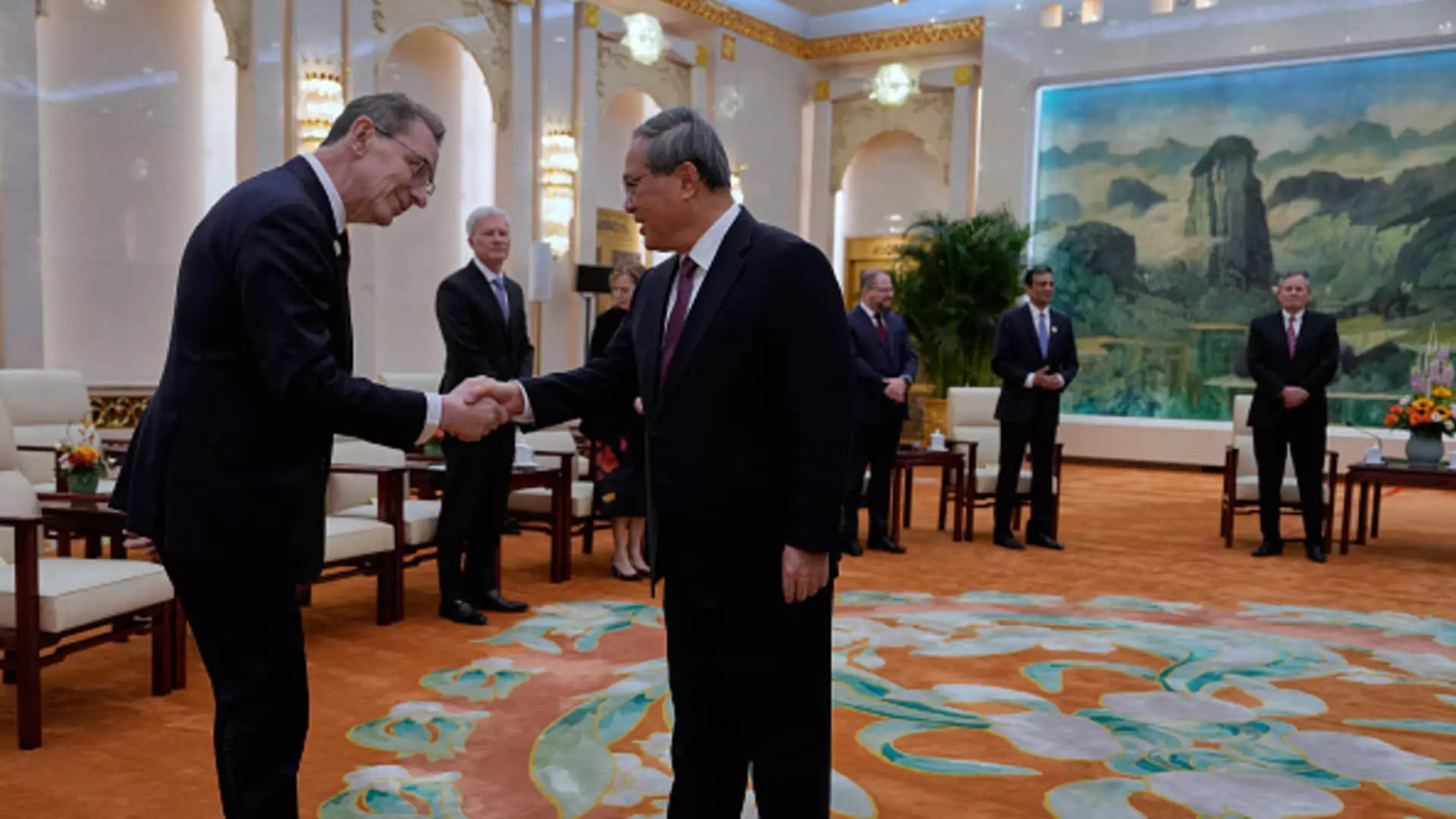In a remarkable turn of events amidst rising tensions between the U.S. and China, Senator Steve Daines recently embarked on a historic visit to Beijing, accompanied by a cadre of influential American business leaders. This marked the first visit by a U.S. politician since the ascendance of Donald Trump, a surreal twist in the ongoing saga of Sino-American relations. Daines, a steadfast ally of Trump and a seasoned player in international trade discussions, took a significant step by engaging with Premier Li Qiang. This meeting wasn’t merely a symbolic gesture; it highlighted a crucial juncture in U.S.-China relations, with both sides grappling for diplomatic footing.
Daines’ presence alongside leaders from major corporations such as Qualcomm and Pfizer indicates a strategic pivot where business interests intertwine with foreign policy. The session was not merely an exchange of pleasantries; it represented an urgent plea for dialogue. In pro-business circles, the concern is palpable: without constructive conversation, economic ramifications could spiral out of control, impacting both nations significantly.
Understanding the Stakes: Economic Interdependence
The delicate dance of U.S.-China relations is underpinned by a stark realization: economies are deeply interconnected, yet also precariously balanced on the precipice of conflict. During his opening remarks, Daines underscored that the collective experience of the attending companies—spanning more than 275 years—speaks volumes about the long-standing commitment of American enterprises to Chinese markets. This assertion serves not merely as a testament to their investment but as a wakeup call to policymakers in both nations: the economic benefits of cooperation cannot be understated.
Beijing’s earnest desire to draw foreign investment becomes particularly evident in light of the looming threat posed by U.S. tariffs. China’s effort to woo foreign CEOs reflects a strategic desperation to counterbalance its struggling domestic economy. It’s a crisis that calls for serious engagement rather than hostility. As Daines himself noted, the bitter consequences of a zero-sum mentality must be avoided for the benefit of both nations.
Tariff Tensions and the Urgency of Dialogue
A cornerstone of the discussions was the impact of tariffs implemented during Trump’s administration, which have since become a point of friction between the two nations. The backdrop to Daines’s meeting is reminiscent of a chess game where every misplaced piece can lead to dire consequences. Relations have reached a pivotal moment, and both sides are at a crossroads. Li Qiang’s remarks about choosing “dialogue over confrontation” encapsulate the essence of the ongoing struggle: an imperative for collaboration in the face of ever-growing economic challenges.
As Daines navigated the labyrinth of political and economic discourse, he highlighted the critical need for China to address the flow of fentanyl precursors into the U.S. This concern is emblematic of larger fears surrounding public health and safety, and it cannot be trivialized. While Daines’s posture as an envoy for corporate America is clear, his role as a bridge-builder in a complicated geopolitical landscape must also be acknowledged.
A Missed Opportunity: The Absence of Broader Engagement
One glaring aspect of this meeting is the absence of an open forum where multiple foreign CEOs could present their concerns. Traditionally, such gatherings have allowed for candid discussions that could lead to significant policy adjustments. Instead, what we witnessed was a closed-door engagement that limited the scope of dialogue perhaps to placate political concerns rather than foster genuine exchange. It raises the question: are we truly committing to a fruitful discussion if we only allow selected voices to be heard?
This aspect of the meeting fuels skepticism around China’s sincerity in welcoming foreign input. If the country genuinely seeks to attract investment and stabilize economic ties, it would serve its interest to broaden discussions across a diverse spectrum of stakeholders. By limiting dialogue to a select few, it risks portraying an image of insular politics that deters other potential foreign investors.
Future of U.S.-China Relations: A Tough Road Ahead
The visit by Daines and his corporate companions serves as a lens through which we can evaluate the frail state of U.S.-China relations. Will this endeavor pave the way for renewed collaboration, or is it merely a fleeting moment in an ongoing cycle of argument and negotiation? The stakes are considerable, and the future hangs in a precarious balance. With influential figures engaging in dialogue, the hope is that the path toward diplomacy, however fraught, is still possible. There’s no denying that in the landscape of global economics, the ability to engage, compromise, and adapt plays a defining role in shaping our collective future.


Leave a Reply